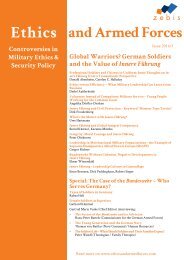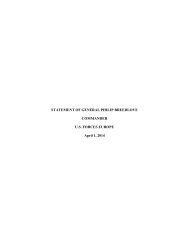FULLTEXT01
FULLTEXT01
FULLTEXT01
Create successful ePaper yourself
Turn your PDF publications into a flip-book with our unique Google optimized e-Paper software.
TACTICAL THOUGHT<br />
2014 September 29 th<br />
1.3 Background to the research focus<br />
The following part describes my thoughts, articulations and motives for the research<br />
focus. It is a reflection of biases habituated during over 30 years in military service. The<br />
text describes an ambition to take on what is considered a classic military problem,<br />
experienced in practice, and outlines a narrative sketch covering the time period 1980 to<br />
2008. An ambition to elucidate the dangers and possibilities of Small Wars during this<br />
period has, in general, been experienced as an up-hill road to travel.<br />
Then suddenly, after 2007, the phenomenon of Irregular Warfare emerged unexpectedly<br />
and was unavoidable to relate to, from strategy to tactics, in practice and theory. The<br />
time had come for an attempt to gain a new and deeper knowledge approach in order to<br />
contribute to the military thought on war fighting. To characterize the researcher’s<br />
perspective of the research object, poses certain challenges and whatever result, the<br />
question of truth becomes hard to measure. Human thinking, in particular one’s own<br />
summaries of events and thinking from the past to now, is a question of memory, will<br />
and intentions. My first intention is however, to describe my view of the inner meaning<br />
of being an officer. Such a meaning is argued to be that tactical knowledge,<br />
understandings and thought are the cornerstones in the officer profession.<br />
However, this meaning does not convey anything if not communicated and put into<br />
practice. The other way around, if practices are not reflected upon and returned to<br />
military theory, tactical thought will hardly develop. Risk for disruption of the<br />
connection to strategy is also thought to be imminent. Depending on internal and<br />
external political and strategic circumstances, different requirements as consequences<br />
emerge in relation to existing military tactics. Life and the world are not static, nor are<br />
thoughts of the same. Doxa and paradigms on the other hand are long-lived. The<br />
officer’s mastery of tactics, and even more importantly, of mental and practical adaption<br />
to other needs than what has been predicted, prioritized and selected to be current<br />
tactical principles, is argued to be a trademark of an officer’s skill. Recurrent situations<br />
occur that fall outside what articulated military tactics can handle and that obviously<br />
applies to the strategy domains to an equal extent.<br />
During my time as an officer, I learned about tactics according to the doctrine of<br />
national invasion defence. Subsequently, I had to think totally differently about tactics<br />
during the submarine violations of Swedish territorial waters in the 1980-90s. That<br />
experience fundamentally challenged my and several other officer colleagues’ mental<br />
picture of what an opponent could do, and what we could or could not do to defend<br />
ourselves. The image and idea that previous knowledge had obvious limitations<br />
mentally and practically, meant that the meaning of a duel was given a new character<br />
when the enemy was hard to be found. However, this insight was for some, of a more<br />
temporary character, such as a strategically-tactical anomaly, probably not to be<br />
encountered again and therefore of a more limited interest. The duel with an enemy that<br />
was hard to find, or acting in a way contemporary tactical paradigms had not described,<br />
gave insights of the need for further tactical thought.<br />
4





